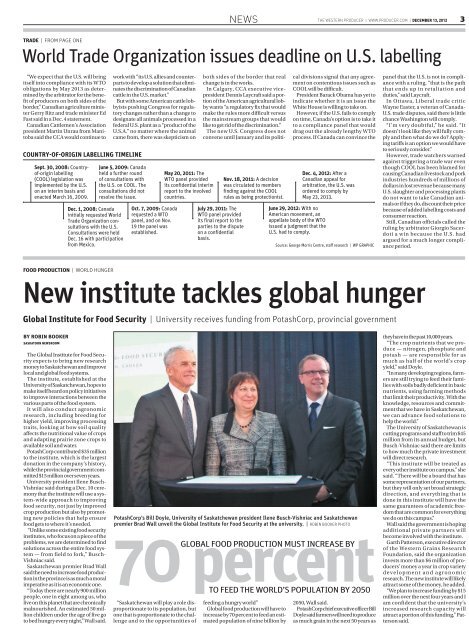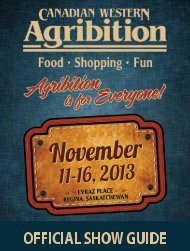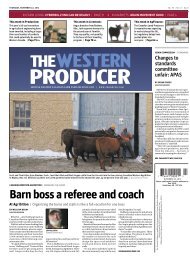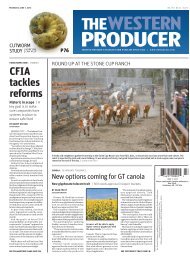You also want an ePaper? Increase the reach of your titles
YUMPU automatically turns print PDFs into web optimized ePapers that Google loves.
“We expect that the U.S. will bring<br />
itself into compliance with its WTO<br />
obligations by May 2013 as determined<br />
by the arbitrator for the benefit<br />
of producers on both sides of the<br />
border,” Canadian agriculture minister<br />
Gerry Ritz and trade minister Ed<br />
Fast said in a Dec. 4 statement.<br />
Canadian Cattlemen’s Association<br />
president Martin Unrau from Manitoba<br />
said the CCA would continue to<br />
work with “its U.S. allies and counterparts<br />
to develop a solution that eliminates<br />
the discrimination of Canadian<br />
cattle in the U.S. market.”<br />
But with some American cattle lobbyists<br />
pushing Congress for regulatory<br />
changes rather than a change to<br />
designate all animals processed in a<br />
federal U.S. plant as a “product of the<br />
U.S.A.” no matter where the animal<br />
came from, there was skepticism on<br />
NEWS THE WESTERN PRODUCER | WWW.PRODUCER.COM | DECEMBER 13, 2012<br />
TRADE | FROM PAGE ONE<br />
World Trade Organization issues deadline on U.S. labelling<br />
COUNTRY-OF-ORIGIN LABELLING TIMELINE<br />
Sept. 30, 2008: Countryof-origin<br />
labelling<br />
(COOL) legislation was<br />
implemented by the U.S.<br />
on an interim basis and<br />
enacted March 16, 2009.<br />
Dec. 1, 2008: Canada<br />
initially requested World<br />
Trade Organization consultations<br />
with the U.S.<br />
Consultations were held<br />
Dec. 16 with participation<br />
from Mexico.<br />
FOOD PRODUCTION | WORLD HUNGER<br />
BY ROBIN BOOKER<br />
SASKATOON NEWSROOM<br />
<strong>The</strong> Global Institute for Food Security<br />
expects to bring new research<br />
money to Saskatchewan and improve<br />
local and global food systems.<br />
<strong>The</strong> institute, established at the<br />
University of Saskatchewan, hopes to<br />
make itself heard on policy initiatives<br />
to improve interactions between the<br />
various parts of the food system.<br />
It will also conduct agronomic<br />
research, including breeding for<br />
higher yield, improving processing<br />
traits, looking at how soil quality<br />
affects the nutritional value of crops<br />
and adapting prairie zone crops to<br />
available soil and water.<br />
PotashCorp contributed $35 million<br />
to the institute, which is the largest<br />
donation in the company’s history,<br />
while the provincial government committed<br />
$15 million over seven years.<br />
University president Ilene Busch-<br />
Vishniac said during a Dec. 10 ceremony<br />
that the institute will use a system-wide<br />
approach to improving<br />
food security, not just by improved<br />
crop production but also by promoting<br />
new policies that help ensure<br />
food gets to where it’s needed.<br />
“Unlike some existing food security<br />
institutes, who focus on a piece of the<br />
problems, we are determined to find<br />
solutions across the entire food system<br />
— from field to fork,” Busch-<br />
Vishniac said.<br />
Saskatchewan premier Brad Wall<br />
said the need to increase food production<br />
in the province is as much a moral<br />
imperative as it is an economic one.<br />
“Today there are nearly 900 million<br />
people, one in eight among us, who<br />
live on this planet that are chronically<br />
malnourished. An estimated 50 million<br />
children under the age of five go<br />
to bed hungry every night,” Wall said.<br />
June 5, 2009: Canada<br />
held a further round<br />
of consultations with<br />
the U.S. on COOL. <strong>The</strong><br />
consultations did not<br />
resolve the issue.<br />
Oct. 7, 2009: Canada<br />
requested a WTO<br />
panel, and on Nov.<br />
19 the panel was<br />
established.<br />
May 20, 2011: <strong>The</strong><br />
WTO panel provided<br />
its confidential interim<br />
report to the involved<br />
countries.<br />
“Saskatchewan will play a role disproportionate<br />
to its population, but<br />
one that is proportionate to the challenge<br />
and to the opportunities of<br />
both sides of the border that real<br />
change is in the works.<br />
In Calgary, CCA executive vicepresident<br />
Dennis Laycraft said a portion<br />
of the American agricultural lobby<br />
wants “a regulatory fix that would<br />
make the rules more difficult versus<br />
the mainstream groups that would<br />
like to get rid of the discrimination.”<br />
<strong>The</strong> new U.S. Congress does not<br />
convene until January and its politi-<br />
July 29, 2011: <strong>The</strong><br />
WTO panel provided<br />
its final report to the<br />
parties to the dispute<br />
on a confidential<br />
basis.<br />
Nov. 18, 2011: A decision<br />
was circulated to members<br />
finding against the COOL<br />
rules as being protectionist.<br />
feeding a hungry world”<br />
Global food production will have to<br />
increase by 70 percent to feed an estimated<br />
population of nine billion by<br />
cal divisions signal that any agreement<br />
on contentious issues such as<br />
COOL will be difficult.<br />
President Barack Obama has yet to<br />
indicate whether it is an issue the<br />
White House is willing to take on.<br />
However, if the U.S. fails to comply<br />
on time, Canada’s option is to take it<br />
to a compliance panel that would<br />
drag out the already lengthy WTO<br />
process. If Canada can convince the<br />
June 29, 2012: With no<br />
American movement, an<br />
appellate body of the WTO<br />
issued a judgment that the<br />
U.S. had to comply.<br />
Dec. 4, 2012: After a<br />
Canadian appeal for<br />
arbitration, the U.S. was<br />
ordered to comply by<br />
May 23, 2013.<br />
Source: George Morris Centre, staff research | WP GRAPHIC<br />
2050, Wall said.<br />
PotashCorp chief executive officer Bill<br />
Doyle said farmers will need to produce<br />
as much grain in the next 50 years as<br />
3<br />
panel that the U.S. is not in compliance<br />
with a ruling, “that is the path<br />
that ends up in retaliation and<br />
duties,” said Laycraft.<br />
In Ottawa, Liberal trade critic<br />
Wayne Easter, a veteran of Canada-<br />
U.S. trade disputes, said there is little<br />
chance Washington will comply.<br />
“I’m very doubtful,” he said. “It<br />
doesn’t look like they will fully comply<br />
and then what do we do? Applying<br />
tariffs is an option we would have<br />
to seriously consider.”<br />
However, trade watchers warned<br />
against triggering a trade war even<br />
though COOL has been blamed for<br />
causing Canadian livestock and pork<br />
industries hundreds of millions of<br />
dollars in lost revenue because many<br />
U.S. slaughter and processing plants<br />
do not want to take Canadian animals<br />
or if they do, discount their price<br />
because of added labelling costs and<br />
consumer reaction.<br />
Still, Canadian officials called the<br />
ruling by arbitrator Giorgio Sacerdoti<br />
a win because the U.S. had<br />
argued for a much longer compliance<br />
period.<br />
New institute tackles global hunger<br />
Global Institute for Food Security | University receives funding from PotashCorp, provincial government<br />
PotashCorp’s Bill Doyle, University of Saskatchewan president Ilene Busch-Vishniac and Saskatchewan<br />
premier Brad Wall unveil the Global Institute for Food Security at the university. | ROBIN BOOKER PHOTO<br />
70 percent<br />
GLOBAL FOOD PRODUCTION MUST INCREASE BY<br />
TO FEED THE WORLD’S POPULATION BY 2050<br />
they have in the past 10,000 years.<br />
“<strong>The</strong> crop nutrients that we produce<br />
— nitrogen, phosphate and<br />
potash — are responsible for as<br />
much as half of the world’s crop<br />
yield,” said Doyle.<br />
“In many developing regions, farmers<br />
are still trying to feed their families<br />
with soils badly deficient in basic<br />
nutrients, using farming methods<br />
that limit their productivity. With the<br />
knowledge, resources and commitment<br />
that we have in Saskatchewan,<br />
we can advance food solutions to<br />
help the world.”<br />
<strong>The</strong> University of Saskatchewan is<br />
cutting programs and staff to trim $45<br />
million from its annual budget, but<br />
Busch-Vishniac said there are limits<br />
to how much the private investment<br />
will direct research.<br />
“This institute will be treated as<br />
every other institute on campus,” she<br />
said. “<strong>The</strong>re will be a board that has<br />
some representation of our partners,<br />
but they will only set broad strategic<br />
direction, and everything that is<br />
done in this institute will have the<br />
same guarantees of academic freedom<br />
that are common for everything<br />
we do on this campus.”<br />
Wall said the government is hoping<br />
additional private partners will<br />
become involved with the institute.<br />
Garth Patterson, executive director<br />
of the <strong>Western</strong> Grains Research<br />
Foundation, said the organization<br />
invests more than $6 million of producers’<br />
money a year in crop variety<br />
development and agronomic<br />
research. <strong>The</strong> new institute will likely<br />
attract some of the money, he added.<br />
“We plan to increase funding by $15<br />
million over the next four years and I<br />
am confident that the university’s<br />
increased research capacity will<br />
attract a portion of this funding,” Patterson<br />
said.








